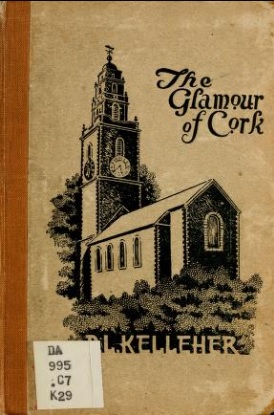|
D. L. Kelleher
      
Life
1883-1958 [Daniel Laurence]; b. Cork; poet reprinted in British and American anthologies; Abbey play, Stephen Gray (n.d.); Poems - Twelve a Penny (Cork 1911); The Glamour of Cork (1919) and other works in the Talbot “Glamour” series. DIW PI
 |
Copy in Boston College Library -
available at Internet Archive - online. |
| A Foreword |
Two facts, especially, condition the history of Cork: its climate and its situation. The mild and languorous air and the excessive moisture in the valley make sustained effort often very difficult; unconsciously one loses faith a little in achievement, out of which, logically, there may grow a certain attitude either of derisive cynicism or of gentle acquiescence. Any invader, while the energy of other places was in him, could rush the town incapable of sustained defence, too, by reason of its commanding hills. So the Danes raided it repeatedly, and the Anglo-Normans stormed it in 1172 and have never entirely let go. Nor can one believe that the Irish really meant to re-take the place, for even in 1261, when the Desmond country all round it was recovered by the MacCarthys, Cork still held for the invader. And ever since that time on to Catholic Emancipation, if not later, the fused Danish [1] and Anglo-Norman upper classes and bourgeoisie have kept it uniquely attached to the British connection. So that, however much the Catholic merchants were persecuted there in Henry VIII’s and Elizabeth’s day, some compensation was offered by way of grants from these cute sovereigns for fines and punishments imposed by their governors upon the Catholics for conscience sake. In no sense then “rebel," as Dublin and Limerick have often been, Cork has developed a highly individualistic life of her own, dominated still by laws of caste and local attitudes such as in the past forbade the marriage of any within the walls with those outside, inventing or following unorthodox political causes as when long ago the inhabitants declared for and against Tudor or Stuart Governments according as they were taxed, or for the sake of their city dignity rather than that of the country as a whole. Thus, explosively enthusiastic, cynically indifferent, vowing, forgetting, ribald and [2] reverent by turns, the pageant passes; saints and “smart boys,” heroes and “gladiaterers,” Samaritans and snobs, all in the story of Cork within the “spreading Lee,” a city that however condemned, how much dissected, must for its surpassing beauty of hill and river return to favour like a lovely, cunning, evasive, compelling woman, at the end. So to your place, reader, while the limes burn! (pp.1-3.)
|
References
Hyland Books (Oct. 1995) lists The Glamour of Cork 1st edn. 1919 [sic]); Cork’s Own Town (1st edn. 1920), 40pp.; The Glamour of the West (1st edn. 1928).
Belfast Public Library holds Glamour of Cork (1912); Glamour of the South [Talbot 1929]; Ireland of the Welcomes; Lovelights of Ireland (1922). Also Poems, 12 a Penny [n.d.]
[ top ]
|
